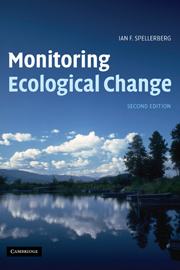Book contents
- Frontmatter
- Contents
- Foreword
- Preface
- Acknowledgements
- Glossary of acronyms and abbreviations
- 1 Ecological monitoring
- 2 Environmental monitoring programmes and organizations
- 3 State of the environment reporting and ecological monitoring
- 4 Biological and spatial scales in ecological monitoring
- 5 Biological indicators and indices
- 6 Diversity and similarity indices
- 7 Planning and designing ecological monitoring
- 8 Community-based ecological monitoring
- 9 Ecological monitoring of species and biological communities
- 10 Ecological monitoring and environmental impact assessments
- Appendix: The 1992 Convention on Biological Diversity
- References
- Index
Foreword
Published online by Cambridge University Press: 18 December 2009
- Frontmatter
- Contents
- Foreword
- Preface
- Acknowledgements
- Glossary of acronyms and abbreviations
- 1 Ecological monitoring
- 2 Environmental monitoring programmes and organizations
- 3 State of the environment reporting and ecological monitoring
- 4 Biological and spatial scales in ecological monitoring
- 5 Biological indicators and indices
- 6 Diversity and similarity indices
- 7 Planning and designing ecological monitoring
- 8 Community-based ecological monitoring
- 9 Ecological monitoring of species and biological communities
- 10 Ecological monitoring and environmental impact assessments
- Appendix: The 1992 Convention on Biological Diversity
- References
- Index
Summary
Ten years ago, when I wrote the Foreword to the first edition of this book, monitoring of the environment was in a paradoxical state. On the one hand, it was an obvious necessity. On the other hand, monitoring all the species in an ecosystem is overwhelmingly demanding – especially since we have grounds for believing that only about a tenth of the species on Earth have been described by science. As I wrote then, in everyday life nobody would think of buying a car without speedometer, fuel gauge, temperature indicator and warning lights. Yet vastly more complicated environmental systems were being perturbed by human impact, and managed in what people hoped was the right way, with very little effective monitoring of how they were actually responding to our interference. Indeed, there was no agreement on what systems of monitoring were likely to be most effective – what warning lights should be fitted to the global juggernaut so that we could at least step on the brakes if it looked like running away. And – here lay the central paradox – while everyone saw that monitoring was essential, at the same time it was not highly regarded as a scientific activity. It appeared to lie a long way from the cutting edges of theoretical ecology and the unravelling of genomes.
The first edition of this book was very timely.
Information
- Type
- Chapter
- Information
- Monitoring Ecological Change , pp. vii - xPublisher: Cambridge University PressPrint publication year: 2005
